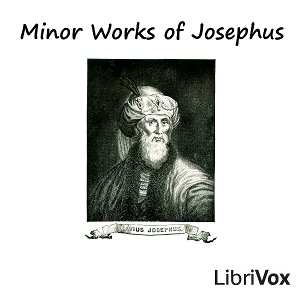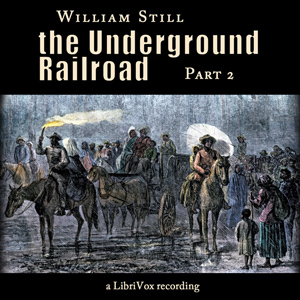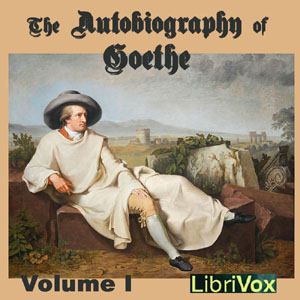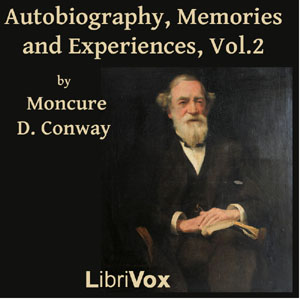In every country there have been certain men and women whose busy lives have made the world better or wiser. The names of such are heard so often that every child should know a few facts about them. It is hoped the very short stories told here may make boys and girls eager to learn more about these famous people. (from the Forward of the text)
30 episodes
An analysis of Johann Sebastian Bach's life and musical compositions, and of the artistic, philosophical, and religious world in which he acted. (Introduction by Kathleen Norland)
19 episodes
These 12 stories give a personal portrait of twelve famous soldiers from the past two centuries. Each story explores the early life of the soldier —to trace his career up from boyhood through the formative years. Such data serves to explain the great soldier of later years. Summary compiled from the preface of the book. (Summary by philchenevert)
25 episodes
This is the autobiography of Elizabeth Keckley, a former slave who bought her freedom with the money she earned as a seamstress. She eventually worked for Mary Lincoln. It is a fascinating book, filled with many recollections of her own life and her interactions with the Lincolns and other members of the government elite. (summary by Guero)
18 episodes
Youth is the third in Tolstoy's trilogy of three autobiographical novels, including Childhood and Boyhood, published in a literary journal during the 1850s. (Introduction by Bill Boerst)
11 episodes

There are 3 parts to this collection.
(1) Against Apion is a two-volume defence of Judaism as classical religion and philosophy, stressing its antiquity, as opposed to what Josephus claimed was the relatively more recent tradition of the Greeks. Some anti-Judean allegations ascribed by Josephus to the Greek writer Apion, and myths accredited to Manetho are also addressed.
(2) Discourse To The Greeks Concerning Hades describes the author's views on the afterlife against the prevailing view of the "Greeks" (i.e., the Greco-Romans) of his day. Although generally still reprinted in editions of Whiston's Josephus, later scholars have realized that this attribution is incorrect. This brief discourse, at least in its original form, is now attributed to the church father Hippolytus.
(3) The Life of Josephus is an autobiographical text written by Josephus in approximately 94-99 CE – possibly as an appendix to his Antiquities of the Jews – where the author for the most part re-visits the events of the War, apparently in response to allegations made against him by Justus of Tiberias. (Summary from Wikipedia)
22 episodes
Phineas Taylor Barnum (July 5, 1810 – April 7, 1891) was an American showman, businessman, and entertainer, remembered for promoting celebrated hoaxes and for founding the circus that became the Ringling Bros. and Barnum & Bailey Circus.His successes may have made him the first "show business" millionaire. Although Barnum was also an author, publisher, philanthropist, and for some time a politician, he said of himself, "I am a showman by profession...and all the gilding shall make nothing else of me," and his personal aims were "to put money in his own coffers". (Reference: Wikipedia.org)
21 episodes
A Merchant talks about daily life inside prisons of England, describes routines and how prisoners are treated. He notes stories of how fellow prisoners came to be in prison, and his ideas about the penal system, its downfalls and ways to improve it. The reader can see similarities to the problems we still have in regarding "criminals" today. (Introduction by Elaine Webb)
20 episodes
A biography of Abraham Lincoln by his long-time law partner, William Herndon and Herndon's collaborator, Jesse Weik. The book is notable for its extensive use of first hand interviews (unusual for its time) and for Herndon's overriding determination to convey an affectionate but frank picture of his law partner's life story as remembered by Lincoln's family, friends, associates and neighbors. (Summary by RalphK)
36 episodes
Elia Peattie was an outspoken journalist and social activist who gave her attention to such areas as orphanages, charity hospitals, the Wounded Knee massacre, capital punishment, and the like. The Precipice is partially based on the life of her close friend Katherine Ostrander, a social work pioneer, and tells of the evolution of Kate Barrington after her college years and with it the evolution of society as a whole and women in particular in pre-World War I America. Friendship, romance, betrayal, searchings of the soul, dreams, and shattered hopes -- all the stuff of life -- bring Kate to full realization of her true self. (Introduction by Mary Schneider)
35 episodes
The recollections of a British infantryman who served in the British army during the Napoleonic Wars. ( Summary by Graham Keeling)
17 episodes
A biography of Samuel de Champlain, French explorer, founder of Quebec, and father of New France. ( Summary by Cathy Barratt )
16 episodes
A biography of Queen Elizabeth the First, the last monarch of the Tudors. (Summary by Brendan Stallard)
12 episodes
A sketch of the lives of some of America's early Statesmen: George Washington, Benjamin Franklin, Thomas Jefferson, Alexander Hamilton, Andrew Jackson, Daniel Webster, Henry Clay, Charles Sumner, Ulysses S. Grant, and James A. Garfield. (Summary by Barry Eads)
20 episodes
This biography is actually a series of essays by prominent personalities of the time that shed light on John Stuart Mill's life and areas of endeavor. Those areas include his experiences in India House, his moral character, certain botanical explorations, how effective he was as a critic, studies in morals and the law, and discoveries concerning political economy. They also explore ideas concerning his influence on institutions of higher learning, accomplishments as a politician, and fame as a philosopher. (Summary by Bill Boerst)
13 episodes
In 1822, Aaron Smith, a young English seaman, was taken captive by Cuban pirates when his ship was boarded en route from Jamaica to England. Forced to work as a navigator and as a member of pirate boarding parties, he witnessed unspeakable acts of murder and torture. Befriended by a young Cuban woman, he managed to escape with his life, but was arrested as a pirate in Havana and sent back to England in chains. There, he found himself on trial for his life at the Old Bailey courthouse—with the attorney general himself leading the prosecution. Smith's dramatic account of his personal experience is a brutally honest, unromanticized [sic] look at piracy in the 19th century. (Summary by Google Books)
8 episodes
Moncure Daniel Conway was an American abolitionist, Unitarian, clergyman and author. This second volume of his autobiography covers the years from the US Civil War to roughly 1904. (Summary by JoeD)
45 episodes
Perhaps the first memoir written by a film celebrity, Pearl White's Just Me gives a first-person account of the actress' rise to stardom. White guides us through her early childhood, her development as a performer, and finally to her breakout role in The Perils of Pauline--a role that made her the most popular "serial queen" of early cinema. Although romanticized and somewhat embellished, this book gives us a fascinating glimpse into the film industry's earliest years and the various myths of film stardom. (Summary by ChuckW)
14 episodes
Ulysses S. Grant was the great hero (for the North) in the Civil War and the 18th President of the United States. This short biography is only 145 pages in a little pamphlet size. The author is famous for his stories of the Old West, but he also wrote a substantial body of nonfiction literature. (Summary by David Wales)
9 episodes
A good book by the oil revolutionist of the 20th century. As they say "Men should listen to experience" and this book is all about the experience of the second highest taxpayer of the US during the 20's. Though it is not in the book, this is a small poem he wrote:
I was early taught to work as well as play,
My life has been one long, happy holiday;
Full of work and full of play-
I dropped the worry on the way-
And God was good to me everyday. (Summary by sidhu177)
8 episodes
This is the biography of Abraham Lincoln, written by two of his private secretaries. (Summary by ashleighjane)
26 episodes
Alexander Hamilton was a significant figure in the political and economic development of the early United States. He served in the American Revolutionary War and became an aide to General George Washington. He was one of the authors (along with John Jay and James Madison) of a series of essays know as The Federalist Papers, which were written in support of the ratification of the proposed Constitution. Scholars and others still refer to these essays to this day for interpretation of the Constitution. As the first Secretary of the Treasury in George Washington’s Cabinet, Hamilton was a proponent of a strong centralized government. Hamilton pursued many actions (some controversial) in an attempt to provide financial stability for the new government, including the establishment of the U.S. Mint and a National Bank. Ironically, he may most often be remembered for the infamous pistol duel with Aaron Burr that resulted in Hamilton’s death. (Summary by lubee930)
14 episodes

This memoir was undertaken at the request of many of Mrs. Prentiss' old and most trusted friends, who felt that the story of her life should be given to the public. Much of it is in the nature of an autobiography. Her letters, which with extracts from her journals form the larger portion of its contents, begin when she was in her twentieth year, and continue almost to her last hour. They are full of details respecting herself, her home, her friends, and the books she wrote. A simple narrative, interspersed with personal reminiscences, and varied by a sketch of her father, and passing notices of others, who exerted a moulding influence upon her character, completes the story. A picture is thus presented of the life she lived and its changing scenes, both on the natural and the spiritual side. While the work may fail to interest some readers, the hope is cherished that, like STEPPING HEAVENWARD, it will be welcomed into Christian homes and prove a blessing to many hearts; thus realising the desire expressed in one of her last letters: Much of my experience of life has cost me a great price and I wish to use it for strengthening and comforting other souls. (Summary by George Prentiss)
59 episodes
A collection of brief biographies and the text from scripture that was significant in the life of each. It is biography and devotional Bible study expertly woven together to produce interesting and inspirational stories. (Summary by Tim Bower)
23 episodes
A comic dialogue written in John Collier's idiosyncratic version of the 18th century South Lancashire dialect together with a collection of 19th century texts on Collier and his work. Egged on by Meary (Mary), Tummus (Thomas) recounts the series of misadventures that ensue when he makes a trip to Rochdale on an errand for his master. First published in 1746, the text grew over subsequent editions as Collier expanded the story, added a preface in which he berates publishers who had pirated his work, and inflated and amended his glossary. The text read here is the final version of the preface, dialogue and glossary, which appeared in an 1862 edition of Collier's works. Collier's texts are followed by several accounts of Collier's life and commentaries on his work, Elijah Riding's 1860 'plain English' translation of the Tummus and Meary text, and three poems set at Collier's graveside in Rochdale. (Summary by Phil Benson)
20 episodes
”This book, the rather unpremeditated production of several months’ work, is by a man who is not a novelist and who is therefore entirely unfitted to write about women who are novelists.” The author is a literary reporter and from that perspective he offers a short biographical sketch “of all the living American women novelists whose writing, by the customary standards, is artistically fine . . . [or] whose writing has attained a wide popularity.” This book was published in 1918. (Summary taken from the Introduction by MaryAnn)
33 episodes
Joan of Arc is a folk heroine of France and a Roman Catholic saint. Claiming divine guidance, she led the French army to several important victories during the Hundred Years' War, which paved the way for the coronation of Charles VII of France. Captured by her enemies, she was sold to the English and put on trial for charges of "insubordination and heterodoxy". She was burned at the stake for heresy when she was 19 years old. Twenty-five years after her execution, an inquisitorial court examined the trial, pronounced her innocent, and declared her a martyr. Joan of Arc was beatified in 1909 and canonized in 1920. She is one of the patron saints of France. Most of what is known today of her story comes from the detailed court records of her trials. (Summary by timothyFR)
7 episodes

”It was my good fortune to lend a helping hand to the weary travelers flying from the land of bondage.” William Still.
"Dear Sir:—For most of the years I have lived, the escape of fugitives from slavery, and their efforts to baffle the human and other bloodhounds who tracked them, formed the romance of American History. That romance is now ended, and our grandchildren will hardly believe its leading incidents except on irresistible testimony. I rejoice that you are collecting and presenting that testimony, and heartily wish you a great success." Horace Greeley.
William Still is often called the Father of the Underground Railroad. Over 14 years, he helped hundreds of slaves escape to freedom in Canada. Still was committed to preserving the stories of the bondmen and he kept careful records of the many escaped slaves who passed through the Philadelphia “station”. The Underground Railroad was published in 1871 from Still’s records and diaries. In bringing you these stories, Librivox volunteers are reading from the 1878 edition. (Summary by MaryAnn)
Complete list of recordings comprising this book:
The Underground Railroad, Part 1,
The Underground Railroad, Part 2,
The Underground Railroad, Part 3,
The Underground Railroad, Part 4,
The Underground Railroad, Part 5.
34 episodes
Confessions (Latin: Confessiones) is the name of an autobiographical work, consisting of 13 books, by St. Augustine of Hippo, written between AD 397 and AD 398. Modern English translations of it are sometimes published under the title The Confessions of St. Augustine in order to distinguish the book from other books with similar titles. Its original title was "Confessions in Thirteen Books", and it was composed to be read out loud with each book being a complete unit. (Summary by Wikipedia)
31 episodes

"This is one of the most remarkable volumes of the century. Its publication has only been made possible by a combination of circumstances which seldom attend the birth of a book. Before emancipation, and while the bane of slavery was on the country, the thrilling facts of this volume could not have been made public. Peace and the blessing of freedom permit their publication, free circulation and unmolested reading.Of all the thousands who favored freedom for the slaves, who gloried in the odium attached to anti-slaveryism, who witnessed the frequent efforts of the bondsmen to escape, who aided them in their quest for liberty, few dared to take notes of what they witnessed, and fewer still dared to preserve them, lest they should be turned into witnesses against them.But one man, and that the author of this book, is known to have succeeded in preserving anything like a full account of the workings of the UNDERGROUND RAILROAD, as it was called before emancipation. These records grew on his hands during the years he acted as Chairman of the Philadelphia Branch of that celebrated corporation, until they reached the extent of the present volume. They are made up of letters received, of interviews held, of narratives taken down at the time, of real reminiscence and authentic biography. Nothing imaginative enters into the composition of the volume. It is simply succinct history, always startling, sometimes bloody. The annals of no time since the Inquisition are so full of daring ventures for life and liberty or heroic endurance under most trying circumstances." (from the Publisher)William Still is often called the Father of the Underground Railroad. Over 14 years, he helped hundreds of slaves escape to freedom in Canada. Still was committed to preserving the stories of the bondmen and he kept careful records of the many escaped slaves who passed through the Philadelphia “station”. The Underground Railroad was published in 1871 from Still’s records and diaries. In bringing you these stories, Librivox volunteers are reading from the 1878 edition. (Summary by MaryAnn)
Complete list of recordings comprising this book:
The Underground Railroad, Part 1,
The Underground Railroad, Part 2,
The Underground Railroad, Part 3,
The Underground Railroad, Part 4,
The Underground Railroad, Part 5.
35 episodes
Kit Carson was a famous hunter, trapper, mountain man, guide - an American icon. Stories about him abounded in popular contemporary literature, but most was pure fiction. This work is the authorized biography, much of it in his own words. It was first published right around the time of his death. (Summary by Lynne Thompson)
33 episodes

This Autobiography of Goethe has a lengthy introduction and short biography of Goethe's life by Thomas Carlyle (1795-1881) and was translated by John Oxenford (1812-1877) in 1848, which was a year of revolutions in Europe. Johann Goethe was a literary celebrity by the age of 25 and was ennobled by the Duke of Saxe-Weimar, Carl August in 1782 after first taking up residence there in November of 1775 following the success of his first novel, The Sorrows of Young Werther (available on Librivox). He lived in Germany from 1749-1832. This period corresponds to the same time as the Seven Years' War, and the French and American Revolutions (1754-1815). Goethe was a member of the Sturm und Drang literary movement. This group of writers believed that literature should shock the audience in order to produce extreme emotions as a counterbalance to the rationalist movement which promoted detachment in the sciences. This is the first part of his autobiography, which he called Truth and Fiction or Truth and Poetry depending on the translator. Goethe wrote poems, such as, The Sorcerer's Apprentice, as well as plays, novels and some scientific works. He wrote the play Faust which is also available on Librivox. He was an Anti-Enlightenment writer. Margaret Fuller (1810-1850) assisted with the 1839 English translation of Johann Peter Eckermann's Conversations with Goethe in the Last Years of his Life.One reader, Barbara, submitted the following after reading a little of the book. "The publisher, J. H. Moore, seems to have cobbled his book together from sources which are not properly acknowledged if at all. For instance, the "Introduction" merely pinches an essay by Thomas Carlyle which was published in 1828. Google gives the publication date of "The Autobiography of Goethe" as "1901?" (Summary by Wikipedia and Craig Campbell)
33 episodes

"Never before has the working of the Underground Railroad been so thoroughly explained. Here we have in complete detail the various methods adopted for circumventing the enemies of freedom, and told, as it is, with great simplicity and natural feeling, the narrative is one which cannot but make a deep impression. Thrilling incidents, heroic adventures and noble deeds of self-sacrifice light up every page, and will enlist the heartiest sympathies of all generous souls. It was eminently just that such a record of one of the most remarkable phases of the struggle against slavery should be prepared, that the memory of the noble originators and supporters of the railroad might be kept green, and posterity enabled to form a true conception of the necessity that called it into existence, and of the difficulties under which its work was performed. The labor of compiling could not have fallen into more appropriate or better qualified hands." The Philadelphia Inquirer William Still is often called the Father of the Underground Railroad. Over 14 years, he helped hundreds of slaves escape to freedom in Canada. Still was committed to preserving the stories of the bondmen and he kept careful records of the many escaped slaves who passed through the Philadelphia “station”. The Underground Railroad was published in 1871 from Still’s records and diaries. In bringing you these stories, Librivox volunteers are reading from the 1878 edition. (Summary by MaryAnn)
Complete list of recordings comprising this book:
The Underground Railroad, Part 1,
The Underground Railroad, Part 2,
The Underground Railroad, Part 3,
The Underground Railroad, Part 4,
The Underground Railroad, Part 5.
35 episodes
This little book was intended for the education of school children and includes tales, sketches and anecdotes of his life written for the children of the mid 1800's and written in the English languge of that period. Each chapter has numerous questions intended for the the reader or the teacher to quiz themselves to see if they gathered the pertinent information. The quiz questions will not be recorded. Also part of this book are numerous short essays written by Franklin on various topics. These entertaining and insightful samples occupy sections 17 through 27. (Summary by phil chenevert)
27 episodes

"The work is intensely interesting. Many of the narratives thrill the reader through and through. Some of them awaken an indignation, a horror, or a sense of humiliation and shame that makes the blood curdle or the cheek flush, or the breathing difficult. The best and the worst sides of human nature are successfully exhibited. Here heroism and patience stand out transfigured; there selfishness and brutality hold carnival till it seems as though justice had been exiled and God had forgotten his own. The number of cases reported is very large, and the method in which the author has done his work is commendable. There is no rhetorical ambition. The narratives are embodied in plain language. The facts are left to make their own impression, without an attempt to embellish them by the aid of imagination." From the "Morning Star," Dover, New Hampshire.
William Still is often called the Father of the Underground Railroad. Over 14 years, he helped hundreds of slaves escape to freedom in Canada. Still was committed to preserving the stories of the bondmen and he kept careful records of the many escaped slaves who passed through the Philadelphia “station”. The Underground Railroad was published in 1871 from Still’s records and diaries. In bringing you these stories, Librivox volunteers are reading from the 1878 edition. (Summary by MaryAnn)
Complete list of recordings comprising this book:
The Underground Railroad, Part 1,
The Underground Railroad, Part 2,
The Underground Railroad, Part 3,
The Underground Railroad, Part 4,
The Underground Railroad, Part 5.
41 episodes

She is also known as St.Thérèse of Child Jesus. She was born at Alençon, France, 2 January 1873; died at Lisieux 30 September 1897. When she was fifteen she applied for permission to enter the Carmelite Convent, and being refused by the superior, went to Rome with her father, as eager to give her to God as she was to give herself, to seek the consent of Pope Leo XIII, then celebrating his jubilee. He preferred to leave the decision in the hands of the superior, who finally consented and on 9 April 1888, at the unusual age of fifteen, Thérèse Martin entered the convent of Lisieux where two of her sisters had preceded her. The account of the eleven years of her religious life, marked by signal graces and constant growth in holiness, is given by Soeur Thérèse in her autobiography, written in obedience to her superior and published two years after her death. In 1901 it was translated into English, and in 1912 another translation, the first complete edition of the life of the Servant of God, containing the autobiography, "Letters and Spiritual Counsels", was published. Its success was immediate and it has passed into many editions, spreading far and wide the devotion to this "little" saint of simplicity, and abandonment in God's service, of the perfect accomplishment of small duties. The fame of her sanctity and the many miracles performed through her intercession caused the introduction of her cause of canonization only seventeen years after her death, 10 June 1914. Thérèse was beatified on 29 April 1923 and canonized on 17 May 1925, by Pope Pius XI, only 28 years after her death. (Summary by Wikipidia)
22 episodes

Manfred Albrecht Freiherr von Richthofen (2 May 1892 – 21 April 1918), also widely known as the Red Baron, was a German fighter pilot with the Imperial German Army Air Service (Luftstreitkräfte) during World War I. He is considered the top ace of that war, being officially credited with 80 air combat victories.Originally a cavalryman, Richthofen transferred to the Air Service in 1915, becoming one of the first members of Jasta 2 in 1916. He quickly distinguished himself as a fighter pilot, and during 1917 became leader of Jasta 11 and then the larger unit Jagdgeschwader 1 (better known as the "Flying Circus"). By 1918, he was regarded as a national hero in Germany, and was very well known by the other side.Richthofen was shot down and killed near Amiens on 21 April 1918. There has been considerable discussion and debate regarding aspects of his career, especially the circumstances of his death. He remains perhaps the most widely known fighter pilot of all time. This recording is a short autobiography of Manfred von Richthofen. For information, the Ordre Pour le Mérite, was also known by the flyers as The Blue Max. (Summary by Wikipedia and Tom Weiss)
7 episodes
A short biography of the 20th U.S. President. Garfield was raised in humble circumstances on an Ohio farm by his widowed mother and elder brother. Before he was elected president in the Republican party he was first elected to Congress in 1862 as Representative of the 19th District of Ohio. Then to the Senate in 1880. His presidency lasted just 200 days—from March 4, 1881, until his death on September 19, 1881, as a result of being shot by assassin Charles J. Guiteau on July 2, 1881. (Summary by Wikipedia and wtomcho)
20 episodes
Elbert Hubbard visits the homes of authors, politicians, poets, philosophers and other prestigious people. If they are still living he speaks with them about their work. If they are dead he reflects on how their surroundings may have influenced them. These short essays are part biography, part interview and part pontification of Hubbard's opinion of the subject and their oeuvre. In this volume he reflects on his own life, as well as on those of George Eliot, Thomas Carlyle, John Ruskin, William E. Gladstone, J.M.W. Turner, Jonathan Swift, Walt Whitman, Victor Hugo, William Wordsworth, William M. Thackeray, Charles Dickens, Oliver Goldsmith, William Shakespeare and Thomas A. Edison. - Summary by Lucy Perry This is Volume 1 in a series of 14 books.
32 episodes

"I congratulate you that, after much patient research, careful preparation, and untiring labor, you have completed your voluminous work on "THE UNDERGROUND RAILROAD." I am sure your work will be found to be one of absorbing interest, worthy of the widest patronage, and historically valuable as pertaining to the tremendous struggle for the abolition of chattel slavery in our land. No phase of that struggle was so crowded with thrilling incidents, heroic adventures, and self-sacrificing efforts as the one you have undertaken to portray, and with which you were so closely connected, to wit: "THE UNDERGROUND RAILROAD." While it will be contemplated with shame, sadness, and astonishment, by posterity, it will serve vividly to illustrate the perils which everywhere confronted the fugitives from the Southern "house of bondage," and to which those who dared to give them food and shelter were also subjected." Wm. Lloyd Garrison
William Still is often called the Father of the Underground Railroad. Over 14 years, he helped hundreds of slaves escape to freedom in Canada. Still was committed to preserving the stories of the bondmen and he kept careful records of the many escaped slaves who passed through the Philadelphia “station”. The Underground Railroad was published in 1871 from Still’s records and diaries. In bringing you these stories, Librivox volunteers are reading from the 1878 edition. (Summary by MaryAnn)
Complete list of recordings comprising this book:
The Underground Railroad, Part 1
The Underground Railroad, Part 2
The Underground Railroad, Part 3
The Underground Railroad, Part 4
The Underground Railroad, Part 5.
39 episodes
One evening, some time after the great Crimean War of 1854-55, a company of military and naval officers met at dinner in London. They were talking over the war, as soldiers and sailors love to do, and somebody said: "Who, of all the workers in the Crimea, will be longest remembered?"
Each guest was asked to give his opinion on this point, and each one wrote a name on a slip of paper. There were many slips, but when they came to be examined there was only one name, for every single man had written "Florence Nightingale." Every English boy and girl knows the beautiful story of Miss Nightingale's life. Indeed, hers is perhaps the best-loved name in England since good Queen Victoria died. It will be a great pleasure to me to tell this story to our own boys and girls in this country; and it shall begin, as all proper stories do, at the beginning. - Summary by the author
15 episodes
“American Men of Mind” is a collection of short biographies of men of note in various disciplines. It is an absorbing collection of short biographies of men who made a difference in American history; most beginning life in very humble circumstances, both in the United States and in foreign countries. Although “men” is mentioned in the title, Mr. Stevenson also relates biographies of several women.This is a most interesting read.(William Tomcho)
21 episodes
Edith L. Cavell (1865–1915) was a British nurse who attended to soldiers of both sides during World War I, and helped some 200 Allied soldiers escape from German-occupied Belgium, for which she was arrested, court-martialed, found guilty of treason and sentenced to death. Attempts to mount an appeal failed, and she was summarily executed within hours of the sentence by a German firing squad. Publication of the news prompted spontaneous grief and worldwide condemnation. Many memorials were created around the world, including a statue adjacent to Trafalgar Square in London. --Adapted from Wikipedia
NOTE: After recording Chapter 7, the reader became aware that the subject's family pronounced the surname as it rhymes with "gravel", and he therefore pronounces it CAvel in subsequent chapters.
The first edition of this book was published in 1916. The final portion of Chapter 15 is from a later edition. ( Wikipedia page on Edith Cavell)
15 episodes
The Boys’ Life of Abraham Lincoln is a biography with many anecdotes that takes one deeper into the thoughts, personality, and beliefs of the man that was Lincoln. While the title indicates the book is about Lincoln’s life as a boy, the book is a full, if somewhat shortened biography. It is very well written and was a joy to record. One might ask, "Who was Helen Nicolay?" Her father, John George Nicolay, was Abraham Lincoln's private secretary and doubtless much of the material comes from his complete biography of Abraham Lincoln. ( Summary by Tom Weiss)
13 episodes
In 1914, at the age of 51, the novelist and poet May Sinclair volunteered to leave the comforts of England to go to the Western Front, joining the Munro Ambulance Corps ministering to wounded Belgian soldiers in Flanders. Her experiences in the Great War, brief and traumatizing as they were, permeated the prose and poetry she wrote after this time. Witness of great human pain and tragedy, Sinclair was in serious danger of her life on multiple occasions. This journal makes no attempt to be anything more than a journal: a lucid, simple, heart-breaking account of war at first hand. - Summary by Expatriate
18 episodes

Twenty years ago, now, I attempted (but was not especially successful in the task) to establish upon the personal knowledge that my own residence as a pupil in the historical Pensionnat in the Rue d'Isabelle, at Bruxelles gave me of the facts of Charlotte Brontë's relationships to Monsieur and Madame Heger, right impressions about the experiences and emotions she underwent between 1842 and 1846, and that supply the key and clue to the right interpretation of her genius. Every opinion I then ventured to state, not upon the authority of any special power of divination or of psychological insight of my own, but solely upon the authority of this personal knowledge of Monsieur and Madame Heger in my early girlhood, and also of the information I owed to the friendship and kind assistance given me, in my endeavour to rectify false judgments, by the Heger family, has quite recently, not only been confirmed, but established upon entirely incontrovertible evidence, by the generous gift made to English readers throughout the world of the key needed to unlock once and for ever the tragical but romantic 'Secret' of Charlotte Brontë. - Summary by Frederika MacDonald
12 episodes
Letters from a Farmer in Pennsylvania is a series of essays written by the Pennsylvania lawyer and legislator John Dickinson (1732–1808) and published under the name "A Farmer" from 1767 to 1768. The twelve letters were widely read and reprinted throughout the thirteen colonies and were important in uniting the colonists against the Townshend Acts. (Wikipedia)
12 episodes
In this book, Burton Egbert Stevenson writes a brief biography of some of the most noteworthy men in American history. He begins at the very beginning of the history of America with Christopher Columbus and proceeds forward with the story of people who made America what it is today by their respective vocations. It is interesting to note that the vast majority of the subjects started in poverty and excelled financially and in stature.He makes something that could be very dull, a very readable and enjoyable book. (Summary by William Tomcho)
23 episodes
This book is above all things the story of a mother. But it is also the story of a noble woman—a woman who was truly great, for the reason that she never sought to be so. Because she understood the sphere in which a woman's work in the world must usually lie, and led her life truly along the lines that God had laid down for her; because she suffered bravely, forgot herself for others, and remained faithful to her noble ideals, she ruled as a queen amongst those with whom her life was cast. Her influence was great and far-reaching, but she herself was the last to suspect it, the last to desire it, and that was perhaps the secret of its greatness. The type is rare at the present day, but, thank God! there are Monicas still in the world. If there were more, the world would be a better place. - Summary from the book
11 episodes

Johan August Strindberg was a Swedish playwright who has had many of his works read into Librivox by volunteers. From his earliest work, Strindberg developed forms of dramatic action, language, and visual composition so innovative that many were to become technically possible to stage only with the advent of film. He is considered the "father" of modern Swedish literature. The Growth of a Soul is Strindberg's own literary autobiography and recreation of the spirit of the times at Upsala University and his attempts to become a literary artist. The work ends with the publication of his novel The Red Room (1879). It is the autobiography of a thinking soul. He discusses the works of such souls as Friedrich Schiller (1788-1805), Christopher Jacob Boström (1797-1866), Soren Kierkegaard (1813-1855) and Henry Thomas Buckle (1821-1862).(Wikipedia and Soupy)The history of the development of a soul can be sometimes written by giving a simple bibliography; for a man who lives in a narrow circle and never meets great men personally, seeks to make their acquaintance through books. The fact that the same books do not make the same impression, nor have the same effect upon all, shows their relative powerlessness to convert anybody. For example, we call the criticism with which we agree good; the criticism which contradicts our views is bad. Thus we seem to be educated with preconceived views, and the book which strengthens, expresses and develops these makes an impression on us. The danger of a one-sided education through books is that most books, especially those composed at the end of an era, and at the university, are antiquated. The youth who has received old ideals from his parents and teachers is accordingly necessarily out of date before his education is completed. When he enters manhood, he is generally obliged to fling away his whole stock of old ideas, and be born again, as it were. Time has gone by him, while he was reading the old books, and he finds himself a stranger among his contemporaries. August Strindberg
17 episodes

















































